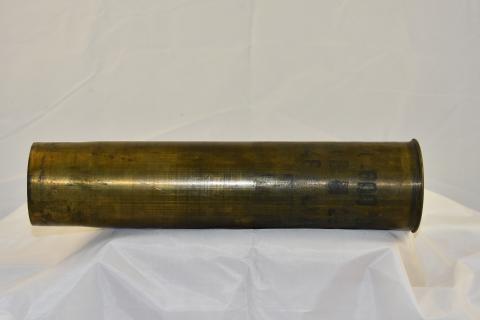This is a tall brass 75mm artillery shell produced by the French Army during the First World War. It is a larger caliber round meant to be fired from the French Model 75 field gun. The inscription "75 DE C" on the bottom surface of the shell indicate its French manufacture. "DE C" on French munitions stands for "canon de campagne"; literally "field gun" in English. On the side of the shell, there is an area which has been printed with American designations in black lettering. This suggests that this shell was originally produced by the French but used by the American Expeditionary Force (AEF) during the war. At the start of the war, the French Army had approximately 4,000 Model 75 field guns in service; by the armistice, they had fielded over 12,000. When the United States entered the war, the AEF lacked sufficient munitions and arms to wage industrial warfare, which resulted in the purchase of many British and French armaments for use by American soldiers. The United States was supplied with 2,000 Model 75 field guns, which makes it likely that this shell was fired from an American-owned cannon of the same make. The efficiency of the Model 75 set the precedent for many light field guns during the twentieth century. This content can be used with the following resources: SS.4.25: Technological Change This content can be used to educate students on the advancements that were made to munitions technology during the First World War and how those advancements impacted the lives of Iowa servicemen. For any use other than instructional resources, please check with the organization that owns this item for any copyright restrictions.
2018.002.027 [Shell, Artillery]
Legal Status
Copyright to this resource is held by the Iowa Masonic Library and Museum and has been provided here for educational purposes only, specifically for use in the Iowa Museum Association's "Teaching Iowa History" project. It may not be downloaded, reproduced or distributed in any format without written permission from the Rights Holder. For more information on U.S. and International copyright laws, consult an attorney.

